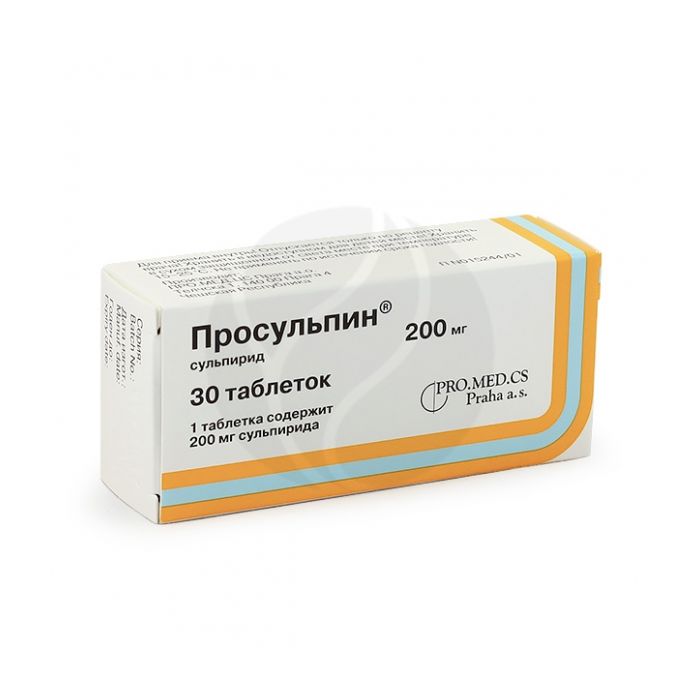Prosulpin tablets 200mg, No. 30
Expiration Date: 05/2027
Russian Pharmacy name:
Просульпин таблетки 200мг, №30
As monotherapy or in combination with other psychotropic drugs:
acute and chronic schizophrenia;
acute delirious conditions;
depression of various etiologies;
neuroses and anxiety in adult patients with the ineffectiveness of conventional treatment methods (only for 50 mg tablets);
severe behavioral disturbances (agitation, self-harm, stereotypy) in children over the age of 6, especially in combination with autism syndromes (only for 50 mg tablets).
Inside, 1-3 times a day with a small amount of liquid, regardless of food intake. It is not recommended to take the drug in the afternoon (after 4 pm) due to the increased activity level.
The goal of therapy is to achieve the minimum effective dose.
Tablets 200 mg
Acute and chronic schizophrenia, acute delirious psychosis, depression: the daily dose ranges from 200 mg to 1000 mg, divided into several doses.
Tablets 50 mg
Neuroses and anxiety in adult patients: the daily dose is from 50 to 150 mg for a maximum of 4 weeks.
Severe behavioral disorders in children over 6 years of age: the daily dose is 5 to 10 mg / kg of body weight.
Doses for the elderly: The starting dose should be 1/4 to 1/2 of the adult dose.
Doses for patients with impaired renal function. Due to the fact that up to 92% of sulpiride is excreted from the body through the kidneys, it is recommended to reduce the dose of sulpiride and / or increase the interval between taking individual doses of the drug, depending on the creatinine clearance parameters (see table):
| Creatinine clearance, ml / min | Sulpiride dose,% standard | Increasing the interval between doses |
| 30-60 | 70 | 1.5 times |
| 10-30 | fifty | 2 times |
| <10 | 34 | 3 times |
| Pills | 1 tab. |
| sulpiride | 50 mg |
| 200 mg | |
| excipients: potato starch; lactose monohydrate; colloidal silicon dioxide; hypromellose K4M; hypromellose K15M (for tablets 200 mg); magnesium stearate; talc |
in a blister 10 pcs.; in a pack of cardboard 3 blisters.
hypersensitivity to sulpiride or another component of the drug;
prolactin-dependent tumors (eg, pituitary prolactinomas and breast cancer);
hyperprolactinemia;
acute poisoning with alcohol, sleeping pills, narcotic analgesics;
affective disorders, aggressive behavior, manic psychosis;
pheochromocytoma;
breastfeeding period;
children under 18 years of age (for 200 mg tablets);
children under 6 years of age (for 50 mg tablets);
in combination with:
- sultopride;
- dopamine receptor antagonists: amantadine, apomorphine, bromocriptine, cabergoline, entacapone, lisuride, pergolide, piribedil, pramipexole, quinagolide, ropinirole (see section 'Interaction').
Carefully
It is not recommended to prescribe sulpiride to pregnant women, except in cases where the doctor, having evaluated the balance of benefits and risks for the pregnant woman and the fetus, decides that the use of the drug is necessary.
It is not recommended to prescribe sulpiride in combination with alcohol, levodopa, drugs that can cause ventricular arrhythmias of the 'torsade des pointes' type: class Ia antiarrhythmics (quinidine, hydroquinidine, disopyramide) and class III (amiodarone, sotalol, dofetilide, ibutilide); some neuroleptics (thioridazine, chlorpromazine, levomepromazine, trifluoperazine, cyamemazine, amisulpride, tiapride, pimozide, haloperidol, droperidol); other drugs such as bepridil, cisapride, diphemanil, i.v. erythromycin, mizolastine, i.v. vincamine, halofantrine, pentamidine, sparfloxacin, moxifloxacin, etc.
Due to the presence of lactose in the preparation, sulpiride is contraindicated in congenital lactase deficiency, lactose intolerance, glucose-galactose malabsorption.
Precautions should be taken when prescribing sulpiride to patients with renal and / or hepatic insufficiency, a history of neuroleptic malignant syndrome (NMS), a history of epilepsy or seizures, severe heart disease, arterial hypertension, Parkinson's syndrome / disease, with dysmenorrhea, in the elderly ...

